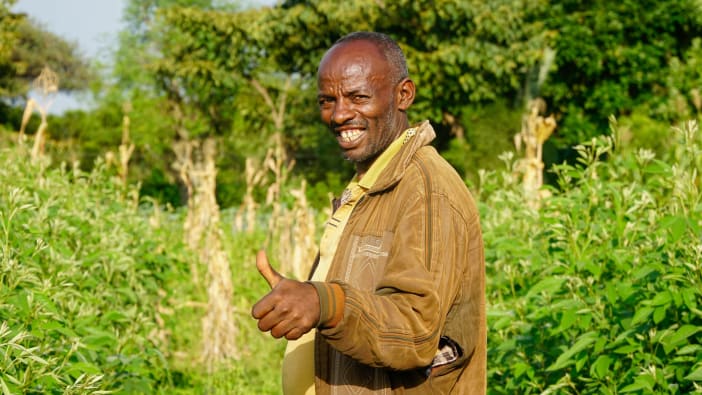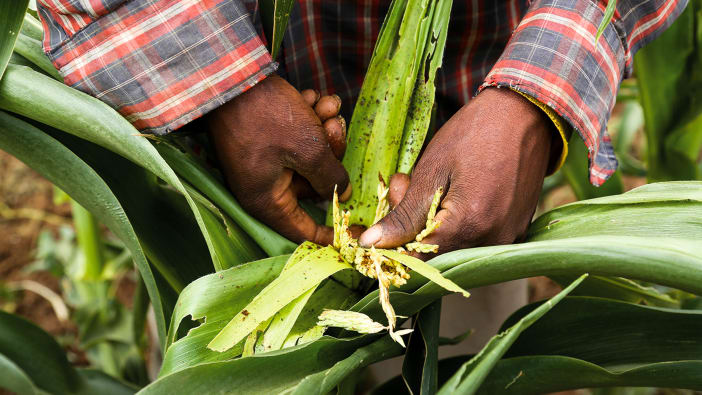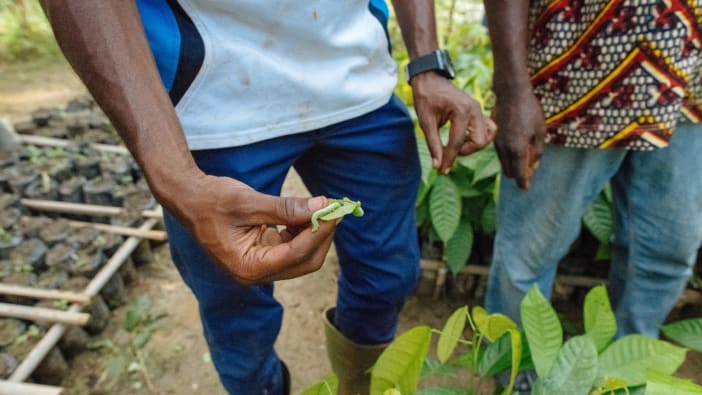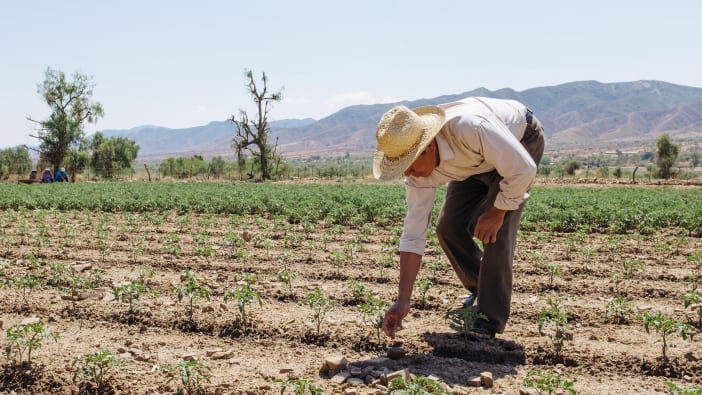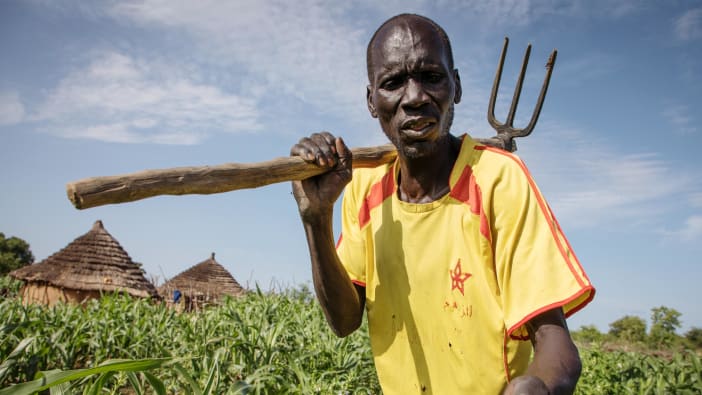These Bible studies are designed to use in small groups. They may provide a useful introduction to a meeting where different topics from the Guide are being discussed. Choose a study that will be linked to the topic you plan to study or that is relevant to your situation. During the studies, encourage people to reflect on what they read, to discuss the meaning and the implications of what they learn and, finally, to pray together about what they have learnt.
BIBLE STUDY 1 God’s view of trees
Trees are mentioned at both ends of the Bible, and play a crucial role in both situations.
Read Genesis 2:8-9.
- How does God regard trees?
Read Revelation 22:1-2.
- Why do you think God chose a tree to illustrate eternal life?
This tree symbolises the completion of God’s saving grace in Jesus Christ. How grateful we are that it was on another tree – the cross – that our sin (which began with Adam and Eve disobeying God and picking the fruit from the one forbidden tree) was forgiven.
BIBLE STUDY 2 Trees and difficult times
Read Deuteronomy 20:19-20.
- What commands are given here about the use of trees during war?
In war the rules of life change. People can forget to love in the same way. The environment suffers too. In those days, trees were cut down to use in attacking enemy cities. God could not stop that, as wars sometimes become unavoidable. Instead he tried to limit the damage caused by war. So fruit trees were not to be cut down. Why? Because it was not in their future interests. No fruit trees mean no fruit, less food and hungry people. Here is plain teaching that we have no right to destroy trees and forests without a real need.
- Can you think of mistakes made in your local area, which have later meant less food (or worse health)?
BIBLE STUDY 3 Bearing fruit as Christians
Read Mark 11:12-14 and 11:20-21.
This story seems out of character for Jesus. He normally gave encouragement to others so it seems surprising that he cursed this fig tree. The tree was covered in healthy leaves, which are usually produced at the same time as the flower buds from which figs later develop. The flower buds resemble the ripe fig in appearance. But Jesus found no flower buds or ripe fruits – only lots of leaves.
- Did Jesus curse the tree because he was tired or hungry? Or did he have another reason for doing this?
- What was Jesus teaching about the need for us to bear fruit?
- What kind of fruit should we be bearing as Christians?
- What can give the appearance of a full Christian life – like the leaves – without actually producing any fruit?
- Who do you think Jesus was talking to here? His disciples, the crowd or the religious authorities?
This is a parable that provides us with a clear lesson on the need to ensure that our lives don’t just look good from the outside but are producing the kind of fruit that Jesus wants to see.
BIBLE STUDY 4 Responsibility to God
Read Deuteronomy 6:4-5, Genesis 1:26 and Genesis 2:15.
These verses all teach us something about our duty towards the land and God’s creation.
- Discuss the part that God expects us to play. What does this mean in practical terms in our own lives?
- When we work in our farms and gardens, look after our animals and care for the sick, on whose behalf are we really working? See Psalm 24:1-2.
- When our children or our neighbours are sick or unhealthy because they are not properly fed, who is most concerned?
- In what ways is it possible for us to spoil things that belong to God?
Discuss how we can work together to care for God’s creation. Pray that we will learn more effectively what it means to be responsible stewards.
BIBLE STUDY 5 Caring for the environment
Read Matthew 10:29-31.
- Are small birds important to God? Yes! He feeds them and he even ‘clothes’ the plants with beautiful flowers (Matthew 6:25-30). But even more, he cares for people. We were created in his image. He can even check if one of our hairs has gone missing! So while we should care for the environment (and birds and plants) because God cares, we should care for people even more.
- Are there any changes in our local area which should be made, because they will clearly help the people who live there?
- If changes are made, will some other people oppose it because the environment (trees, animals, rivers etc) is more ‘special’ to them than the people who would benefit? How can you solve this problem for the good of the community?
In the Bible the whole creation is important, as well as the people. We are meant to work in harmony with the world God has made to support us. Take courage when you seek to protect the environment and the people who live there! This difficult project is also on God’s agenda.
BIBLE STUDY 6 Conserving creation’s fruitfulness
‘How many are your works Oh Lord! In wisdom you have made them all; the earth is full of your creatures’ (Psalm 104:24). God wants us to conserve creation’s fruitfulness.
Read Ezekiel 34:17-19.
- What does this passage reveal about how we should treat God’s creation?
- How should we consider the needs of other people and other creatures?
Because God made all things and holds all things together through Jesus (Colossians 1:15-20), everything belongs to him. While God leads us to green pastures and pure water (Psalm 23), the earth belongs to God alone (Psalm 24:1). His are gifts we do not own. His are gifts that must never be taken from us or the other creatures!
- What are we doing to care for creation and God’s creatures? Do we resist the desire to be greedy (Matthew 6:33)?
- Do we provide places for flowers and birds on our land or in our communities?
Keeping our places fruitful for all God’s creatures brings praise to God, the creator and owner of all things!
BIBLE STUDY 7 Our Father the gardener
We have learned in this guide how to help young trees to grow well – by providing them with manure, compost or fertiliser as they are planted. Trees also grow best and produce most fruit in full sunshine. Here we consider the kind of care and teaching we need as Christians to produce plenty of fruit. This passage pictures God as a careful gardener.
Read John 15:1-8.
- Jesus longs for our lives to be fruitful for him. Are you growing in the full sunlight of God’s love? Reflect on your life and compare it to the growth of a vine or fruit tree.
- Are you firmly grafted into the vine so that its life can flow into you? Are you looking after your relationship to Jesus through study of God’s word, prayer and fellowship with his people?
- What kind of fruit are we bearing for God?
- Do we need God to prune any parts of our lives in order to bear more fruit for him?
In verse 15 Jesus tells us that we can do nothing apart from him. We can only bear fruit for him if we try and become like him and love God with all our hearts, souls, minds and strength. The key word here is ‘all’, not just ‘some’ or ‘most’ but with ‘all’. When we do this, then our lives will shine out with his love for others and we will indeed bear much fruit.
BIBLE STUDY 8 Our need and not our greed
Read Proverbs 30:7-9.
It is good to stop and consider what attitudes control our approach both to farming and to our lives.
- What should our attitude be to what we get from the land?
- How should we treat other people, especially those less fortunate than ourselves?
- How should we regard money?
- What are our reasons for wanting to improve our health and farming? Is it just in order to raise our standard of living – or is it so that we can glorify God in everything that we do?
Pray that we will learn more effectively what it means to be responsible stewards.
BIBLE STUDY 9 Trees as a picture of faith
Read Psalm 1:1-5 and Jeremiah 17:7-8.
- How can Christians be compared to trees? How many comparisons can you find in these passages? What do these verses teach about the Christian faith and what happens in times of difficulty?
- Have you found this true in your lives? If not, why do you think this might be?






